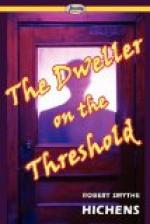“I saw him go home. At last he was sick of his sin. There rose within him that strange longing for goodness, for purity and rest, that terrible, aching desire to be what those who once loved him for long had thought him to be, which perhaps never dies in the soul of a human being. Is it the instinct of the Creator burning like an undying spark in the created? And, as he drew near to his house, there came to him the resolve to speak, to acknowledge, to say, ’This is what I am. Know me as I am! Care for me still, in spite of what I am!’ He went in, and sought her—the woman. She was alone. Sleep had not come to her. Perhaps some instinct had told her she must wake and be ready for something. Then he gathered together the little that was left to him of courage, and he strove to tell her, to make her understand some of the truth, to obtain from her the greatest of human gifts—the love of one from whom a man has no secrets that he can tell.
“She listened for a moment, then she thrust out her hands as if to push the truth of him out of her life. And last night she left him—going in fear of him.”
The professor shook his narrow shoulders, and sprang abruptly to his feet. The ticking of the clock now sounded almost like a hammer beating in his ears.
“It’s time we had some light,” he said in rather a loud voice.
The darkness that was Chichester moved. A gleam of light shone in the little room, revealing the thin Madonna, “The Light of the World,” the piano, the neatly bound books of the curate of St. Joseph’s; revealing Chichester, who now stood facing the professor, white, drawn, lined, but with eyes full of almost hideous resolution and power.
“I advise,” said the professor—“I advise you from this time forward—”




